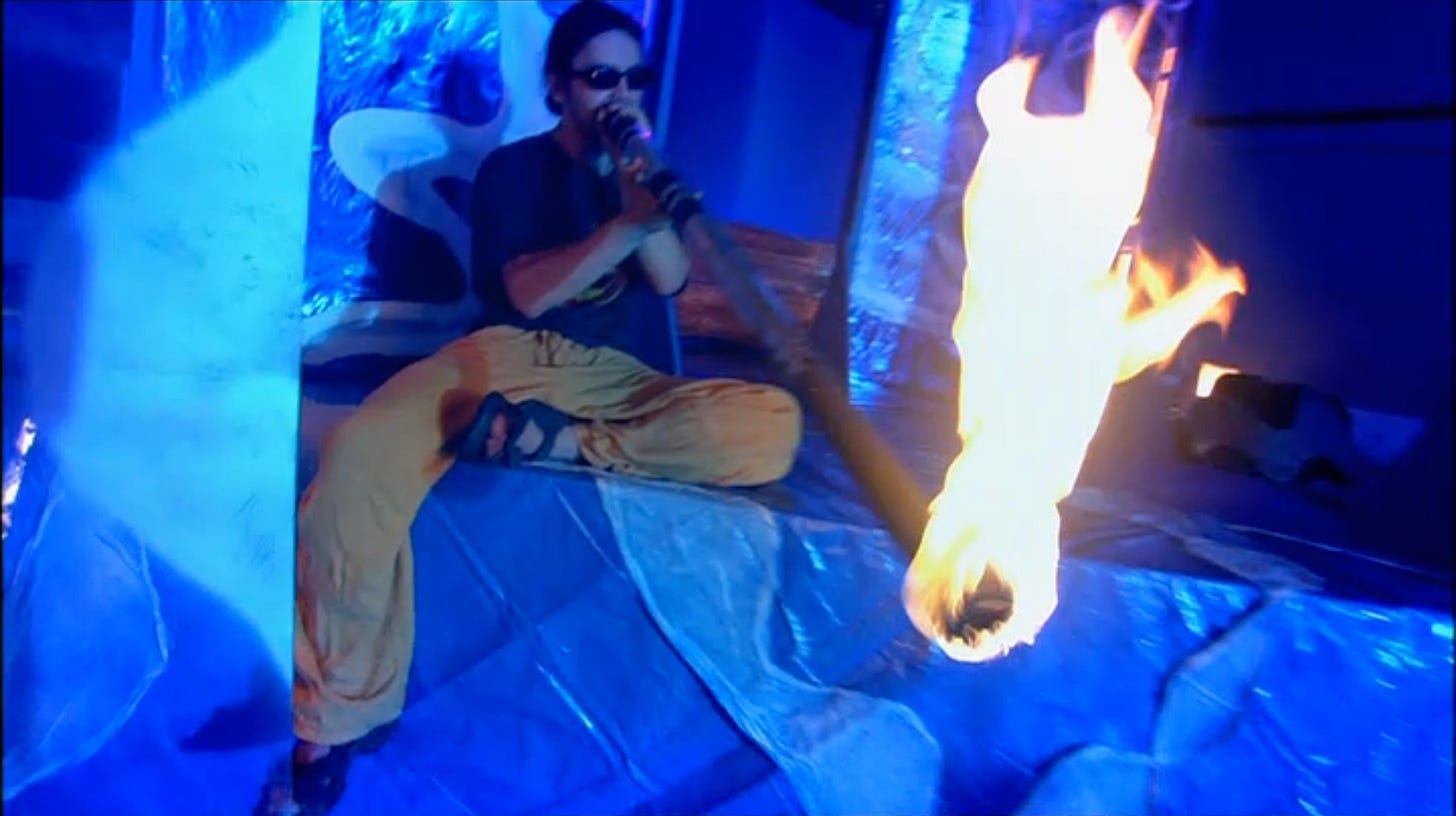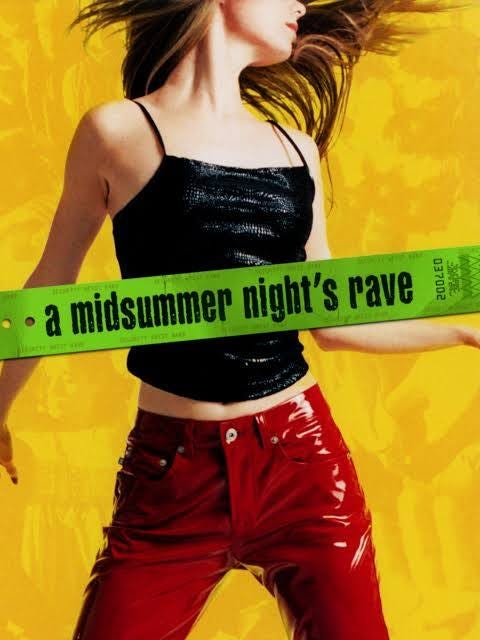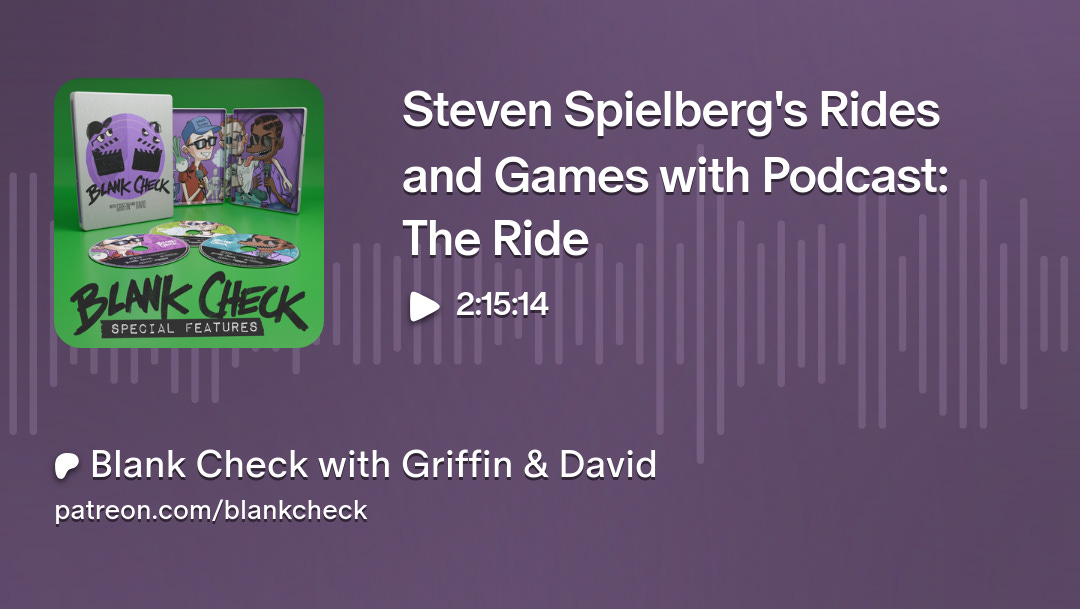Surprise! Blank Check has started a newsletter! Your favorite connoisseurs of context are gonna go on even more tangents, commit to even more bits, and share opinions on even more pieces of entertainment industry news because - hey, why not. Thanks for joining us!
IN THIS WEEK’S EDITION:
THE BARDI PARTY REPORT
I’m sure some stuff happened in movie news this week. Like, America’s theater employees are under attack because of Chicken Jockey fever or whatever. Oh, right. The Cannes lineup. Biggest story there was that they didn’t initially announce the Spike Lee because they would have…only accepted the movie if Denzel showed up to the premiere? Is that right? Cannot roll my eyes hard enough.
We also got an Eddington trailer. Remember 2020? Griffin sure does.
Anyway - WHAT I REALLY WANTED TO WRITE ABOUT THIS WEEK WAS THIS:
“What the hell is Rave Macbeth?”
The Brooklyn Academy of Music is doing a series on “interesting cinematic adaptations of Macbeth,” and while this included such obvious titles as Kurosawa’s Throne of Blood and the 90s Sundance flick Scotland, PA, there was a title that stood out to me so much that I immediately texted David Sims about it.
2001’s RAVE MACBETH.
Literally “What if Macbeth but at a rave?”
One of the first films to be produced, photographed, and edited digitally, directed by some German guy, starring Michael Rosenbaum from Smallville. As of last Friday, it had been logged only 600 times on Letterboxd, never by any of my “friends.” It didn’t even have a Wikipedia entry. This could have been either a disaster or a masterpiece.
Folks, it’s the latter. We’re talking Gregg Araki-caliber visuals (same DP as Nowhere). Macbeth and Banquo are MDMA dealers named Marcus and Troy and they both have spiky hair. The witches are drug-induced hallucinations with razor-sharp cheekbones. Marguerite Moreau is in it as Troy/Banquo’s girlfriend (?) and she has one of those Polaroid iZone cameras that I had in the 5th grade.
Marcus/Macbeth wants to be the “king of the rave.” He does what he has to do to rave. That includes killing multiple people at said rave. Lady Macbeth kills someone with pills in the “chill out room” which looks like it’s Mr. Freeze’s lair. There is a flaming didgeridoo at one point.
All of this to say - we highly recommend. You can watch it for free on archive.org! It also inspired a potential new patreon series: Rave adaptations of Shakespeare. Yes, there is ANOTHER ONE:
LET’S CRACK OPEN THE DOSSIER
Though in the current moment—thanks to the passage of time, thanks to the lackluster string of sequels, or thanks to some people just finally waking up!—Jurassic Park has the rightful reputation of being one of blockbuster cinema’s very sweetest confections, the film was only received semi-warmly—and assuredly not enthusiastically—by the critical community upon release. In the New York Times, for instance, Janet Maslin described the film as a “true movie milestone, presenting awe- and fear-inspiring sights never before seen on the screen.” But later in the review, Maslin wrote that, though on “paper, this story is tailor-made for Mr. Spielberg's talents,” Crichton’s narrative “becomes less crisp on screen than it was on the page, with much of the enjoyable jargon either mumbled confusingly or otherwise thrown away. Sweetening the human characters, eradicating most of their evil motives and dispensing with a dinosaur-bombing ending (so the material is now sequel-friendly), Mr. Spielberg has taken the bite out of this story.”1 In Rolling Stone, Peter Travers’s review opened with “Sure, you can take some critical potshots. We’ll get to that,” as if everyone reading already knew the film had a number of obvious demerits.2 Over at the Washington Post, critic Rita Kempley labeled Jurassic Park both a “dumbed-down adaptation of Michael Crichton's techno-novel” and “not Spielberg at the top of his game,” though she did acknowledge that it was … “dino-mite just the same.”3 And Los Angeles Times critic Kenneth Turan kicked off his review with a pair of question-and-answers: “Do the dinosaurs work? Indeed they do. Does anything else? Not really.” He later described Jurassic Park as the “poor little rich kid of this summer’s movies,” writing, “even in Hollywood there are things a blank check can’t guarantee and the lack of those keeps this film from being more than one hell of an effective parlor trick.”4 But perhaps most surprising among those who held Jurassic Park without the esteem the film now widely carries was the film’s own director: Steven Spielberg. In a 1997 Premiere feature detailing the production of The Lost World, Spielberg characterized his feelings about the first Jurassic Park like this: “I didn’t think it was a perfect film, and it wasn’t so close to my heart that I needed to protect the integrity of a follow-up by preventing anybody else from doing one, which I certainly had the right to do. Among the films that I really think are good movies that I’ve directed, it’s not even in the top five.”5 But by 2013, Spielberg was ready to offer a kinder take on his landmark creature feature, telling Entertainment Weekly that Jurassic Park was, simply, “a helluva yarn.”6
In his three-star review of Jurassic Park, Roger Ebert lodged the following complaint at the film’s director: “When young Steven Spielberg was first offered the screenplay for ‘Jaws,’ he said he would direct the movie on one condition: That he didn’t have to show the shark for the first hour. By slowly building the audience’s apprehension, he felt, the shark would be much more impressive when it finally arrived. He was right. I wish he had remembered that lesson when he was preparing ‘Jurassic Park.’ … The movie delivers all too well on its promise to show us dinosaurs. We see them early and often, and they are indeed a triumph of special effects artistry, but the movie is lacking other qualities that it needs even more, such as a sense of awe and wonderment, and strong human story values.”7 In a sense, Ebert was right: Spielberg acknowledged that he had felt his own internal pressure to move Jurassic Park at a faster pace, telling Empire in 1993 that he knew the movie was “too long for the first 45 minutes.” But Spielberg did still have the same commitment to telling the story the way he saw fit, claiming that there was “nothing he could do” about the pace of the first third of the film, “because I feel it's important to give some of the background in terms of chaos theory and DNA cloning – to set the stage for the audience so they won't have to think about it during the second half of the film, but they'll believe it even more.”8 And though Ebert may have felt the movie rushed too quickly from set piece to set piece, a vocal young member of the film’s audience didn’t seem to agree, according to screenwriter (and UW-Madison’s) David Koepp: “When we announced the sequel, I got this packet of letters from an elementary-school class somewhere outside San Francisco, and one of the kids wrote that we should add a stegosaurus and this and that, but ‘whatever you do, please don’t have a long, boring part at the beginning that has nothing to do with the island.’ In other words, the premise of these movies is so exciting the usual cat-and-mouse game just doesn’t work. The kid is only eight, but he’s right, and I kept his letter on my desk. On my tombstone it’ll say my name, the years I lived, and then, IT TOOK TOO LONG TO GET TO THE ISLAND.”9
One of the things I picked up while researching this movie—which, I should note, was unquestionably my favorite film of all time from the ages of three to maybe fourteen—is that it’s kind of a funny movie to have to talk to the press about because, well, dinosaurs are inherently a little silly, and unless you are a celebrated paleontologist ripping a kid to absolute shreds for daring to disrespect the velociraptor, it’s hard not to talk about them without slipping into childlike awe! For example, here’s a goofy-sounding quote from Steven Spielberg, about how a childhood viewing of a certain Hollywood classic first captured his burgeoning paleontological interest: “I was more interested in the dinosaurs in King Kong than I was in King Kong himself. I thought the T. rex was one of the most awesome dinosaurs of the fossil record!”10 That’s right: one of the very most awesome dinosaurs of the entire fossil record, he said!
Additionally, here is just an absolutely incredible quote from Michael Crichton, in which the noted doctor-turned-author lays out both his reasons for writing Jurassic Park but also the audience-enforced requirements of the job: “I have a collection of feelings about the risks we face, the unthinking arrogance of certain scientific procedures, and if I don’t want to write something for The New England Journal of Medicine, how do I get it out to the widest audience? Piggyback it onto another form, the action thriller. … If you’re going to do a dinosaur book, people must be munched. You know going in that some of your characters are dino fodder — it’s a dirty job, but some characters have to do it. The munches are just there to keep the reader going. The ideas in Jurassic Park are much more important to me than the munches.”11 Take note, everyone: even if your dinosaur story has big ideas, there must—must—also always—always—be munches.
WHAT IS THE TEAM INTO THIS WEEK?
Everyone: We’ve still got art from Blank Canvas on sale via Mutant! Don’t you want to own a custom figure of the fucked up baby from Trainspotting???: https://www.madebymutant.com/blank-canvas-exhibition
David Sims, Host: “Apart from Rave Macbeth I recommend Sinners which is out on Friday and is one of the more exciting large-scale Hollywood movies i’ve seen in, I dunno, A DECADE.”
Griffin Newman, Host: “After MANY bleak years of New York City becoming a physical media desert for film fans I am truly thrilled by the recent opening of Night Owl Video in Williamsburg, BK. Loving packed with used & new mainstream titles, boutique releases, and imports on every format it’s a true joy to be able to browse these things in person again rather than adding to a virtual cart. They also have vinyl soundtracks, Japanese posters, books and more! I couldn’t help but pick up some Blank Check paperbacks (and a mystery Buster VHS) while I was there.”
AJ McKeon, Editor: “How High We Go in the Dark By Sequoia Nagamatsu. A collection of short stories that’s captivating and awesome. Also, Mario Teaches Typing, we set it up on a computer for Hayes to start to learn how to type and it still slaps!!”
Ben Hosley, Producer: “New socks - dang it don’t a new pair of socks feel good! when you snap those puppies on it’s like “oh man I’m alive. Let’s go walk through this world.” So get some new socks at a local store and thank me later bub. Maybe, get a friggin new color you’ve never experimented with before. Like ox blood red. Or aqua green. Go nuts while there’s still time.”
JJ Bersch, Researcher: “Well, the 2025 Wisconsin Film Festival didn’t end exactly how I wanted it to end: my daughter got sick (she’s better now, don’t worry), and I had to miss screenings of my beloved Hong Sang-soo’s By the Stream and friend of the show Bowen Yang’s The Wedding Banquet. But last Monday night—before the cold snuck past her immune system—I was able to catch a pair of perfect movies. First, I saw Tsui Hark’s 1984 comic romance Shanghai Blues. Though it has a logline that reads like a melodrama—while the Japanese army bombs Shanghai in 1937, a man and a woman meet ducking for cover under a bridge, vowing to reunite once the war is over—the film is mostly a comedy of errors: ten years later, the two end up living in the same apartment building, but neither initially realizes who the other actually is. The set pieces are as expertly choreographed as they are incredibly funny, especially a two-minute sequence in which one of the protagonists repeatedly bonks people on the head with a tuba lol. Second, I got to see other friend of the show Alex Ross Perry’s Pavements on the big screen, and it was—totally seriously—probably a top 5 theatrical experience for me. Stephen Malkmus rewired my brain when I was in high school more than maybe anyone else, and I left the theater feeling like the three close friends I saw it with had a much better understanding of why I am the (obnoxious and, of course, by turns brilliant) person I am today: representation matters. The campaign for Robert Greene’s editing Oscar starts NOW.”
Alan Smithee, Pseudonymous Editor: “In the vein of my Golden Idol rec from a few weeks ago: I’ve been playing The Roottrees Are Dead, which is another detective game where you actually have to solve the mystery yourself. Not quite Obra Dinn level, but it’s a good hang, and extremely satisfying when you start to figure out what’s going on. I bought it on Steam, but there’s a free browser version.” **NOTE FROM MARIE - I downloaded this last night on Steam and got hooked.**
THIS WEEK ON THE PODCAST
The Big Picture’s Sean Fennessey joins us and we’re so preoccupied with whether or not we could Talk Tuah, we didn't stop to think if we should Talk Tuah.
And on Patreon, Griff is in his element as the good boys of Podcast: The Ride join us to discuss Steven Spielberg's Rides and Games.
COMING SOON:
New York Times, June 11, 1993.
Rolling Stone, June 11, 1993.
Washington Post, April 5, 2013.
Los Angeles Times, June 11, 1993.
Premiere, May 1997, in Steven Spielberg Interviews, ed. Lester D. Friedman and Brent Notbohm.
Entertainment Weekly, April 4, 2013.
Roger Ebert, June 11, 1993.
Premiere, May 1997, in Steven Spielberg Interviews, ed. Lester D. Friedman and Brent Notbohm.
Entertainment Weekly, April 4, 2013.
Entertainment Weekly, December 7, 1990.






















Proud to say that my high school's 'post-apocalyptic' adaptation of Macbeth from last year did in fact feature a rave / party scene so I feel spiritually connected to Rave Macbeth. 🔥🔥🔥👑👑👑
Keep the Rave Shakespeare coming! How long until we get Rave The Two Noble Kinsmen? Rave King John, anyone?